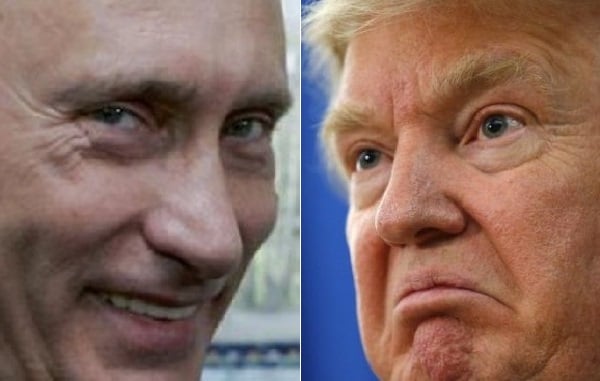
According to reports, U.S President Donald Trump is “eager to meet Russian President Vladimir Putin with full diplomatic bells and whistles” at the Group of Twenty (G20) Summit in Hamburg, Germany on July 7. In fact Trump is “so excited about meeting Vladimir Putin that U.S. officials are worried.” U.S. allies in Europe are also worried. They probably should be worried.
Despite any “diplomatic bells and whistles,” Trump and Putin are also almost certain to meet behind closed doors, with U.S. representation limited to Trump and a small number of close aides in an administration that is under federal investigation for possible collusion with Russia to interfere in the 2016 U.S. presidential election and possible obstruction of justice. Trump’s last meeting with Russian officials – foreign minister Sergei Lavrov and ambassador Sergey Kislyak – included Trump revealing “highly classified information” to his Russian guests behind closed doors in the Oval Office. This shouldn’t inspire confidence in anyone.
Among concerns regarding his meeting with Putin is that “fanboy” Trump will be “too eager to please” the Russian president. According to reports, Trump “has told White House aides to come up with possible concessions to offer as bargaining chips” in his meeting with Putin, though it remains unclear what if anything Putin would be asked to give in return. Among the concessions Trump may offer is rolling back U.S. sanctions against Russia or agreeing to Russian demands for the return of two diplomatic compounds in the United States seized by the Obama administration in retaliation for Russian meddling in the 2016 election.
Foreign policy experts also fear that Trump will be “played” or “outfoxed” by his far more experienced and better-prepared Russian counterpart. Other than offering up concessions to Russia, Trump appears to have no clear agenda for the meeting. Putin, on the other hand, will almost certainly have a list of specific demands or requests to make of Trump. Chief among Russia’s current public demands is the return of the aforementioned diplomatic compounds. What Putin will privately ask of Trump is anyone’s guess.
Among the methods Putin might use to manipulate Trump is to bond with him over supposed “fake news” and the “deep state,” which Trump and his supporters have blamed for Trump’s ongoing Russia problems. To help avoid such pitfalls and improve the optics of the meeting, some administration officials have pressed for the National Security Council’s best known critic of Putin, Fiona Hill, to be included in the meeting. “The idea,” one senior administration official said, “is to get as many adults in the room as humanly possible.” Whether Hill will be included in the meeting remains in question.
A further concern is that Trump appears to have no plans to bring up Russia’s interference in the 2016 election. This is not surprising, given Trump’s mixed signals on whether he believes or wishes to admit that such interference even occurred. Trump is, after all, the apparent beneficiary of Russia’s actions, and to acknowledge such is to bring the legitimacy of his presidency into question. To avoid the topic with Putin would seem to invite further Russian interference in future U.S. elections, which raises obvious questions regarding the motives behind Trump’s refusal to discuss the matter.
At no previous time in America’s history has a U.S. president had as suspect a relationship with a hostile foreign power as Donald Trump has with Russia. At no previous time has a U.S. president displayed such open admiration as Trump has displayed for authoritarian leaders like Putin. The almost daily revelations on Trump’s Russian ties, Russia’s interference in the 2016 election, and possible collusion with Russia by the Trump campaign are more than ample cause for discomfort at the prospect of a private meeting between Trump and Putin.
Trump’s meeting with Putin is preceded by a visit to increasingly authoritarian Poland, where Trump has been promised a “fawning reception” with cheering crowds. To flatter Trump in a country where he is actually quite unpopular, Poland’s right-wing government is reportedly busing “rent-a-crowds” into Warsaw from across the country. Trump’s visit to Poland is seen as a “snub to the European Union” and an opportunity for Trump to use Poland as a “springboard for another attack on the EU.”
Such is the strange new reality of U.S. foreign relations under President Donald Trump.